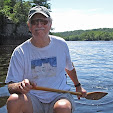
Miracles come in strange and wonderful ways.
This morning, due to a schedule change, instead of my usual one AM hour of one-on-one Spanish, I had two. After a surprisingly rigorous week and a half and a pretty discouraging day yesterday, I was dreading another four hours in the classroom this afternoon. Dear Lord, I was thinking, how I'd love to get outdoors and enjoy some of this gorgeous, lush countryside! After all, I've been here nearly two weeks and haven't been more than a mile or so from downtown; besides, my mind is starting to feel pretty fried. I didn't hurry back to school after lunch—bad sign.
Dutifully, I dragged myself upstairs to meet my profesora, Janeth, and buckle down to work. "I've been thinking, Jeff." she said, "What would you think if we got in my car and went for a drive this afternoon?" I just about kissed her.
We drove north of town, up into the hills, to an area called Alto (Upper) Boquete where we stopped at a sort of tourist information center with a mirador, or observation deck, overlooking the valley and the village of Bajo (Lower) Boquete.
 The place also houses a modest museum of historical exhibits about the town's and the region's (Chiriquí's) origins and development. Janeth recalled how this place had fascinated her when she was a girl. She was transported by the beauty of the panoramas, but her most vivid memory is of a caged lion once kept here, and her subsequent dreams of encountering lions in the dense forests covering much of the area at that time. (Looking over the photos of the town's founding fathers and mothers, we found the one of Guillermo Bell Miranda, the very same Abuelo Guillermo who, at 95, is the patriarch of the home in which I'm staying.)
The place also houses a modest museum of historical exhibits about the town's and the region's (Chiriquí's) origins and development. Janeth recalled how this place had fascinated her when she was a girl. She was transported by the beauty of the panoramas, but her most vivid memory is of a caged lion once kept here, and her subsequent dreams of encountering lions in the dense forests covering much of the area at that time. (Looking over the photos of the town's founding fathers and mothers, we found the one of Guillermo Bell Miranda, the very same Abuelo Guillermo who, at 95, is the patriarch of the home in which I'm staying.) We swung by a little duro stand Janeth likes to see if they had her favorite flavor, coconut. (Duros are home-made frozen fruit ice "pops" made in simple plastic cups and often for sale at roadside stands or out of people's homes.) Alas, they were out of coconut, but she settled for a yogurt flavor, and I had one made from fresh strawberries. It was delicious!
We then drove to the other end of town, and up into an area called Los Naranjos, where we wound up and up into the hills, through coffee fincas, and destitute little settlements of indigenous Ngöbe-Bugle workers hired to work the fields and harvest the coffee granos. It seems impossible that families could function out of such hovels, many of the units no bigger than the smallest motel room you've ever seen, others made of just sticks and scavenged sheets of plastic or sheet metal. Nearly every one of the drab dwellings, though, wore a cheery garland of brightly colored clothes, hung out to dry.

We stopped to enjoy a beautiful waterfall and an amazing rock formation called los ladrillos (the bricks), for its resemblance to such building blocks. The igneous rock has somehow flowed and cracked into what appear to be distinct strands, which reach horizontally across the face of the cliff and then sweep elegantly outward so the viewer's looking at the ends of the strands.

In other places, towering cliffs and graceful waterfalls soared far above us, a breathtaking backdrop to patches of pine forest that reminded me of home in Minnesota.

























